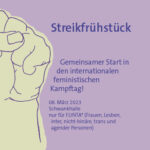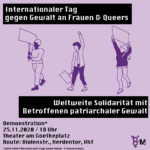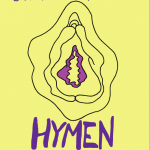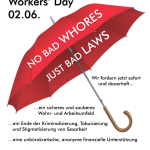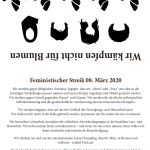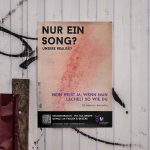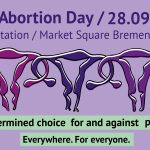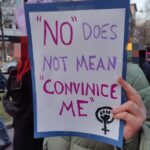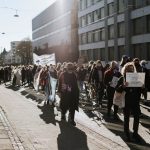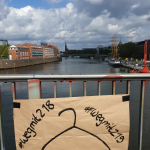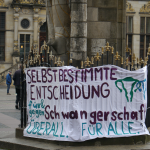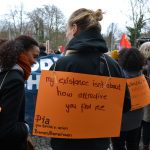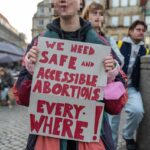We gather here today on Safe Abortion Day with the demand: Self-determined decision for and against pregnancy. Everywhere. For all. Both the right to freedom of decision against and the right to freedom of decision for pregnancy are central demands in the concept of reproductive justice. The concept was developed in the early 1990s by US-American black feminists. These women and their experiences were not reflected in the pro-choice approaches, i.e. the focus on freedom of choice against pregnancy or for abortion. They criticized that these approaches only take up the positions of white, non-disabled and socially privileged people. As black women and queers, they had the experience that they and their communities were and are confronted with rather opposite problems: for example, the linking of welfare state services to sterilization programs, capitalist exclusion and structural, racist violence that makes it difficult or impossible to have and raise children.
Reproductive justice therefore includes not only the right to prevent or terminate pregnancy, but also the right to become pregnant, to make decisions about delivery options and to have children, as well as the right to raise children free of institutional and interpersonal violence. Both the right to terminate a pregnancy and the right to become pregnant must be given to all people!
The decision for or against a pregnancy, for or against children, must be considered against the background of social, economic and political conditions. It is not only an individual decision but always also a political one. In the patriarchal society in which we live, access to bodies with uterus seems legitimate. Feminists* have always been fighting against this!
The demand for the right to decide against children in a self-determined manner, whether generally or at a specific time, and to terminate unwanted pregnancies was and is central to this. In our research we have found that most of the demands from the last decades or even centuries are still relevant. In the Belladonna Archive we came across the diary entries of a practicing doctor from the 1920s. She describes her consternation about the fact that something as self-evident as freedom of choice over one’s own body is not given. Today we are still just as stunned that 100 years later, little has changed! In the same way, we could read a text from the 1980s here and it would probably be hardly noticeable. Unfortunately, not much has fundamentally changed in the last decades: The current supply situation in Germany is still precarious. Still there is the paragraph 218, which criminalizes abortions and the paragraph 219a, which makes informing about it punishable. Still there is an enormous social stigmatization of humans, who want to abort or have aborted. It still does not seem to be a social consensus that one’s own body should only be subject to one’s own decision!
Abortion is a criminal offence under paragraph 218 of the penal code – right behind murder and manslaughter. Abortion is therefore not legal in Germany, except when the pregnancy threatens the health of the pregnant person or results from a rape. Otherwise, they are considered a criminal act of the pregnant person and the physicians performing the abortion. Only under certain conditions are they exempt from punishment. This ties in with debates about the beginning of human life, which is supposedly already at a clump of cells, and leads to the fact that abortion is an enormously morally charged topic and is associated with stigmatization. The embryo is staged as an independent legal entity that must be defended against the selfish interests of the pregnant person who does not fulfill her “maternal duties”. Thus, the legal texts also construct a supposed “duty to carry out”, the basis of which is ultimately extremely outdated, sexist gender roles. Elementary for these roles, in turn, is the construction of gender as binary and biologically determined, from which it follows that all persons with uterus are women and would find their fulfillment in the role of mother. A decision against children is thus presented as “unnatural” and necessarily traumatizing.
But the right to decide about one’s own body is the sole responsibility of the pregnant person! The embryo or fetus is part of the body of the pregnant person and cannot be considered separately from the pregnant person. Therefore, it cannot have an independent “right to life”.
In order to guarantee the pregnant person’s right to self-determination, reforms are ultimately of little help. What is needed is the complete discriminatory treatment of abortions and the provision of information about them! We demand therefore the abolishment of the paragraphs 218 and 219a! Stop the sexist garbage! An end to stigmatization! My body, my choice!
It is important for us to emphasize: It is not only about women, because not all women can get pregnant and not only women get pregnant – but also trans* men, inter* and non-binary persons. We demand: All pregnant people must have the right to and access to a safe abortion! Apart from gender identity, age, social and economic status, disability, ideology, racist attributions, residence status and sexuality must not play a role!
Currently, many regulations limit the right of self-determination of pregnant women. Without a medical or criminological indication, an abortion is only exempt from punishment up to the 12th week of pregnancy and there is an obligation to seek counselling. These compulsory consultations, which according to the law “serve the protection of the unborn life” but at the same time should be open-ended, mean that pregnant women have to justify their wish to have an abortion and are also discouraged. We demand therefore the abolishment of the obligation to advise and instead voluntary and actually open-ended consulting offers!
As far as the costs for an abortion after compulsory counselling are concerned, these are not covered by health insurance, but too often have to be paid by the pregnant person. With costs of up to 600,- this can be an enormous hurdle for a self-determined decision. We demand: Abortion must be basic medical care and be accessible to people regardless of their economic status. That means it must become an unconditional health insurance benefit!
Not least because of the criminalization of abortion and the social mood, the medical care situation is also extremely precarious. On another level, this situation restricts the right of pregnant women to self-determination, since access to abortion can hardly be guaranteed to all. Currently, there is a glaring lack of doctors in Germany who are willing to perform an abortion and have the necessary expertise. Because in medical education abortions are not or hardly ever discussed and taught, since they are criminal offences and are devalued as “immoral”. On the one hand, further training in this area must be paid for by the doctors themselves, and on the other hand, it must be integrated into the already tight schedule of doctors, which in turn is only possible for a few.
In Bremen and the surrounding area there is absolutely no sufficient or satisfactory care situation. Pregnant women from the entire North Sea coast, from Bremen, Bremerhaven and Lower Saxony should be sufficiently and directly cared for in a profamilia center and by five established gynaecologist?
That is not enough! We demand: Safe access to abortions everywhere! This requires a much higher density of care! As a medical service, abortion must be integrated into the medical curriculum and be a natural part of the training of gynecologists.
Just as some people are made extremely difficult to terminate a pregnancy and are forced to become/stay pregnant and have children, many people are structurally prevented from having and caring for children. This is especially true for people who are affected by ableism (i.e. structural discrimination and disability of people in terms of skills), queer hostility or hetero-/Cis-/Dya-normativity (i.e. the idea that all people are heterosexual, identify with the gender assigned at birth and their bodies clearly correspond to gender norms of men and women), classism (i.e. structural discrimination and marginalization in terms of social and/or educational position) and racism.
People who are (dis)abled are denied their sexual self-determination and reproductive rights. For example, they are sterilized much more often than non-disabled people or are given contraceptives almost by force. Both often happen without their explicit consent, because a legal guardian may decide for them or knowledge about sexual self-determination is difficult to access. Basically, these people are often not considered capable of caring for children or there is a fear that the children might inherit the disability, which should be prevented. This reveals the disparate, ableist structures of our society in a rather brutal and disgusting way. Similarly, these ableist patterns of thinking become evident in abortions after prenatal diagnosis, when parents are told to abort a disabled child.
Classist family policies make it difficult for economically deprived people to start a family. For example, the parental allowance is de facto not paid when receiving Hartz IV benefits. And if these people (want to) have children, they are confronted with classist narratives that deny them the right to make this decision consciously or assume that the decision is made out of financial interests.
In the same way, racist discourses that devalue non-White privileged families and their reproduction. The discrimination against BIPoC families is based on the racist assumption that only White Germans are valuable, desirable members of society. Spatial separation through prohibition of family reunification or unsecured residence status also makes it difficult to plan pregnancy and birth safely. Today, we also show solidarity with all Black parents who are denied birth certificates for their children by the registry office here in Bremen.
Also, queer people find it difficult to start a family due to legal and financial hurdles. Instead of immediately registering the child as the parents’ child (without proof), as is the case with cis-hetero couples, in queer relationships the non-pregnant person must go through the lengthy and encroaching procedure of so-called “stepchild adoption”. Surrogacy, for example, is not even legal.
Moreover, queer families constantly encounter heterosexist narratives in their everyday lives that say that children need a mother and a father to develop healthily. Family models with more or less than two parents are socially devalued, declared impractical or not even recognized at all.
Trans* People who are pregnant or who want to become pregnant repeatedly experience the experience of not being accepted in their gender identity.
Pregnancy and childbirth assistance is only designed for cis-women as pregnant and child-bearing persons. Offers for pregnant people who are not female are virtually non-existent. In the birth certificate of their child, trans* parents are absurdly recorded with the old name and civil status even after a change of first name and civil status. And if the marital status is “diverse” and does not fit into this binary picture, the registry office may simply refuse to recognize the person as a parent and may refuse to register the person on the birth certificate.
When we talk about reproductive justice, we must also talk about forced sterilizations of trans* and inter* persons. Because yes, trans* persons in Germany had to undergo a forced sterilization until 2011 to be allowed to change their civil status. And inter* persons are still being operated on today – without their consent, often shortly after birth – to change their sex in order to force them into a biological, two-gender norm. In the course of these violent interventions, inter* persons are often deprived of the possibility of having children from the outset through forced sterilizations or other operations!
Being trans*, inter*, queer, (dis)abled, Black or of Color is still presented as a pathological deviation from the norm. And whoever is sick, so the narrative, must not bring children into the world, otherwise they will also become sick. After all, the state wants a healthy population! So far, so disgusting. It becomes clear: With this topic a direct link can be made to population policy. It becomes very clear who should reproduce and who should not, who is considered a desirable life and who is not, who should be encouraged in the reproduction and who should not. Germany wants children from White, dya-cis-gender, heterosexual, non-disabled academics*. This is pissing us off. We, on the other hand, call for a solidary society that accepts all forms of parenthood and provides support for all parents: regardless of their identity!
We demand a society in which self-determined decisions for and against pregnancy are possible – everywhere and for everyone!


